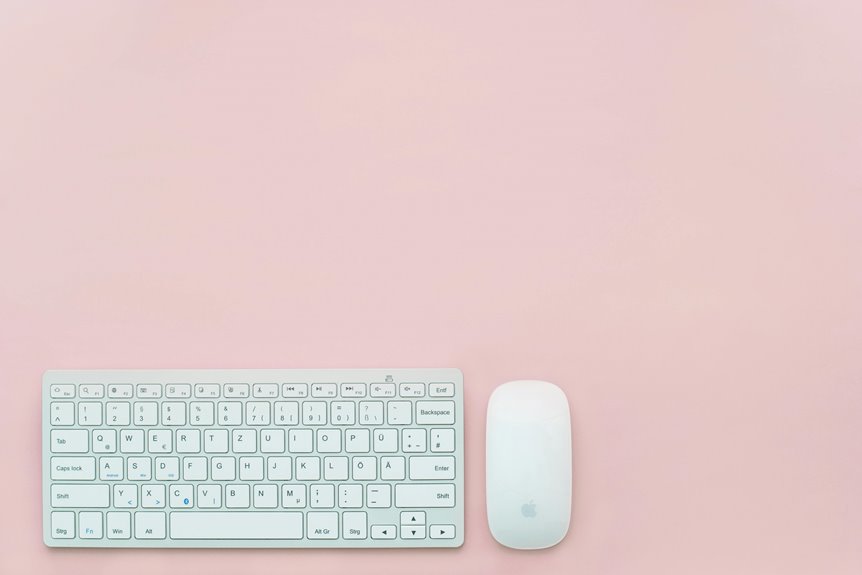Start your simple living journey by decluttering your space and adopting mindful consumption habits. You’ll find peace by focusing on quality over quantity, creating meaningful routines, and practicing intentional purchasing. Incorporate daily wellness habits like meditation, exercise, and time in nature to reduce stress and enhance well-being. Keep a visible to-do list, utilize storage solutions, and maintain a balanced schedule that includes both productivity and rest. By implementing small changes in your daily life, you’ll discover how less truly leads to more contentment and purpose.
Minimalism in Daily Living
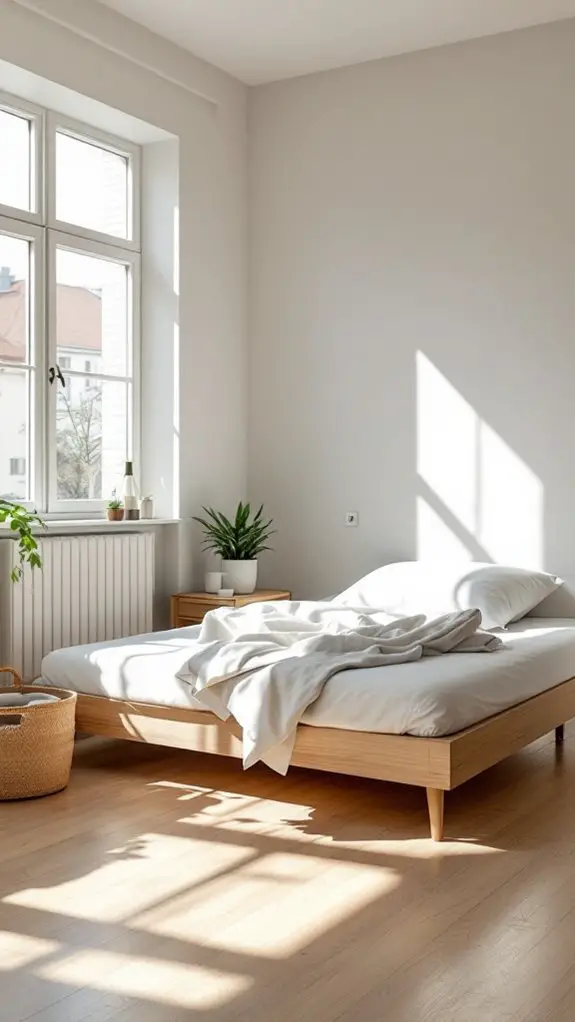
Living with less has become increasingly appealing as people recognize the mental and physical benefits of minimalism. By embracing minimalist habits, you’ll find that simplifying your surroundings can lead to greater peace of mind and improved focus in your daily life.
Start by setting clear boundaries about what you’ll allow into your space. Before bringing new items home, ask yourself if they’re truly necessary for your lifestyle and happiness. Choose multifunctional furniture pieces to maximize your space while maintaining simplicity. Consider creating storage solutions to organize essential items while keeping them out of sight.
Practice continuous decluttering by removing unnecessary items before they become a permanent fixture in your environment. When you’re tempted to make purchases, implement a 48-hour rule – write down what you want to buy and revisit the decision after two days.
You can strengthen your minimalist practice by embracing empty spaces rather than feeling compelled to fill every corner. Empty space serves as a reminder of calm and helps maintain clarity in your environment.
Consider starting a gratitude journal to appreciate what you already have, shifting focus from wanting more to being content with less.
To maintain this lifestyle, simplify your daily routines and limit time-wasting activities. Cut back on unnecessary meetings and reduce social media scrolling. Instead, prioritize experiences over possessions – invest in memories rather than material goods.
When you do need to make purchases, question advertisements critically and assess whether they’re addressing genuine needs or created wants. Remember to use what you already have before buying more, and keep your focus on items that truly serve a purpose in your life.
Declutter Your Living Space
A cluttered living space can drain your energy and productivity, making it harder to focus on what matters most. To reclaim your space and peace of mind, start by focusing on one small area at a time. Empty the space completely and sort items into three categories: keep, donate, or discard. This systematic approach helps prevent feeling overwhelmed while ensuring you make steady progress.
In your living room, begin by clearing flat surfaces of unnecessary items. Remember that visual distractions can significantly increase mental stress. Organize books by color or size, and consider switching to digital versions of magazines to reduce physical clutter. Standing file organizers can help sort and manage each family member’s belongings efficiently.
Use storage solutions like baskets and bins to keep essential items organized but out of sight. When handling personal items, ask yourself if you’ve used them in the last few months and if they justify the space they occupy. For sentimental items you’re hesitant to part with, consider taking photos before letting them go.
Create a system for managing incoming papers and mail immediately to prevent them from piling up. Install hooks for hanging storage to maximize wall space, and utilize DIY organizers to create custom storage solutions that fit your needs.
If you have children, set up easy-to-use storage systems like cubby holes and labeled bins to encourage their participation in maintaining order.
To keep your space clutter-free long-term, establish daily decluttering habits and schedule weekly maintenance sessions. You’ll find that when everything has its designated place, maintaining order becomes second nature, and your living space transforms into a more peaceful, functional environment.
Create Meaningful Morning Routines
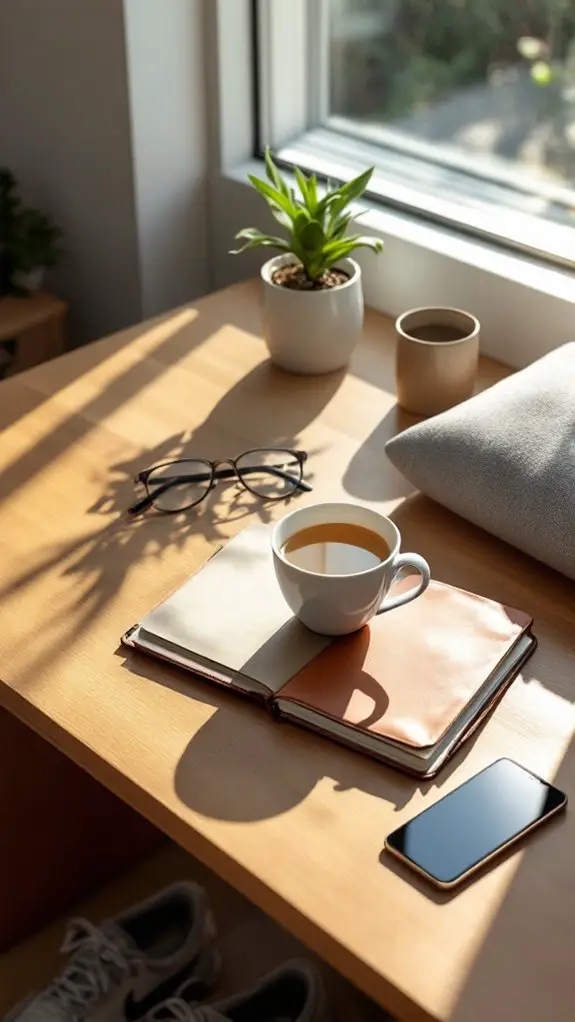
Through mindful planning and intention, creating a meaningful morning routine can transform your entire day. Start by determining how much sleep you’ll need and set a consistent bedtime that allows for adequate rest. Plan your morning activities thoughtfully, considering essential tasks you’ll need to accomplish before leaving the house or starting work. Making your bed first thing can create a chain of productivity that carries throughout your day.
You’ll want to wake up early enough to avoid rushing through your routine. Begin with simple acts like drinking water and taking a few deep breaths to center yourself. The quiet morning hours between 4 AM and 6 AM offer peak productivity potential. To minimize stress, prepare items like coffee, clothes, and breakfast the night before. This preparation allows you to focus on more meaningful activities when you wake up.
Incorporate mindfulness practices that resonate with you, such as meditation, light stretches, or brief outdoor time in natural light. Consider adding physical activity to boost your energy levels naturally. Don’t forget to include activities that bring you joy, whether it’s reading, journaling, or pursuing a creative hobby.
Build efficiency into your routine by maintaining consistency and eliminating non-essential tasks. Set aside time for quick cleaning activities to keep your space tidy, and prioritize self-care moments that help you start the day positively.
Remember that your routine should be flexible enough to adapt to changing schedules while maintaining its core benefits. Regularly review and adjust your morning practices to guarantee they continue serving your needs effectively. A well-crafted morning routine shouldn’t feel like a burden but rather a foundation for a more balanced and purposeful day.
Mindful Consumption Habits
Mindful consumption empowers you to make intentional choices about what enters your life, from everyday purchases to long-term investments. It’s not about achieving perfection but rather making progress through small, meaningful changes in how you acquire and use resources.
Start by evaluating your current purchasing habits and identifying areas where you can make more conscious decisions. Before buying something new, ask yourself if you truly need it or if it’s an impulse purchase. Creating a shopping list helps maintain focused buying decisions when shopping. Clean spaces promote better mental clarity and decision-making when evaluating purchases.
When you do need to buy, prioritize quality over quantity by investing in durable items that will last longer and provide better value over time.
Consider exploring secondhand options before buying new. You’ll often find well-maintained items at lower prices while supporting local businesses and reducing environmental impact.
When purchasing new items, research brands that align with your values, focusing on those that prioritize ethical sourcing and environmental responsibility.
Declutter regularly to maintain a mindful relationship with your possessions. Donate, sell, or recycle items you no longer need, and be intentional about what you bring into your space. This practice not only reduces stress but also helps you appreciate what you already own.
You’ll discover that mindful consumption offers both financial and emotional benefits. By making deliberate purchasing decisions, you’ll save money while reducing waste.
More importantly, you’ll experience greater satisfaction and less stress as you cultivate a more intentional lifestyle. Remember that each small choice contributes to personal growth and a more sustainable future.
Time Management Made Simple
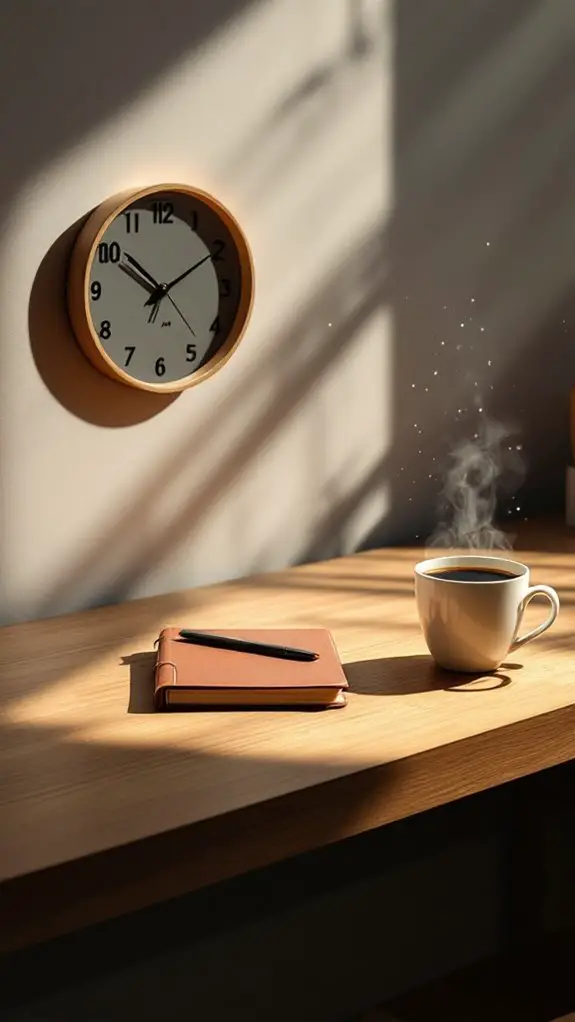
Managing your time well complements mindful consumption by streamlining your daily activities and reducing stress. By implementing simple time management techniques, you’ll gain control over your schedule and create space for what truly matters in your life.
Start by adopting the Pomodoro Technique – work in focused 25-minute intervals followed by short breaks. This method helps you maintain concentration while preventing burnout. When planning your day, write down your top three priorities each morning and tackle your most challenging task first, following the “Eat That Frog” principle. Learning to say no effectively helps protect your priorities and prevents overcommitment. Keeping a visible to-do list helps enhance your focus and track your progress throughout the day.
Create a simple system using both digital and physical tools that work for you. Use your calendar to block specific times for tasks, and don’t forget to include buffer periods between activities. Set reminders for important deadlines, and batch similar tasks together to maximize efficiency. Remember to limit digital distractions by controlling notifications on your devices.
To maintain productivity, focus on one task at a time instead of multitasking. Apply the 80/20 rule by identifying which activities yield the most significant results and prioritize them. Schedule regular breaks throughout your day to recharge, and don’t forget to allocate time for learning and professional growth.
Keep your time management system straightforward by using a basic to-do list and calendar. Group related tasks, set clear priorities, and create realistic time blocks for your activities. This approach helps you maintain focus while reducing the overwhelming feeling that often comes with complex scheduling systems.
Natural Living Essentials
A gentle shift toward natural living starts with selecting essential products that support both personal wellness and environmental health. You’ll find that incorporating sustainable alternatives into your daily routine can make a significant impact on both your well-being and the environment.
Start with your personal care routine by switching to bamboo toothbrushes and natural soaps made from goat’s milk and Encompass oil. These products provide effective cleansing while nourishing your skin without harsh chemicals. For lip care and skin health, incorporate organic tea tree oil and natural lip balms into your regimen. The tea tree oil costs $12.99 and offers numerous natural health benefits.
Transform your living space with eco-friendly aromatherapy options. Consider using essential oils to enhance relaxation, as they offer significant savings through customized subscriptions. You can use pure beeswax tea lights for natural lighting, while myrrh resin and lemon grass essential oil create a calming atmosphere.
Lavender sachets in your drawers and Palo Santo sticks help maintain a fresh, peaceful environment throughout your home.
In the kitchen, opt for sustainable tools like an olive wood mortar and pestle, which adds both functionality and natural beauty to your space. When it comes to cleaning, choose plant-based products free from chlorine, petroleum, and phthalates.
These alternatives are just as effective as conventional cleaners but won’t compromise your indoor air quality.
Remember that natural living isn’t about replacing everything at once. Focus on essential items that you use daily, and gradually build your collection of sustainable products.
Digital Detox Strategies
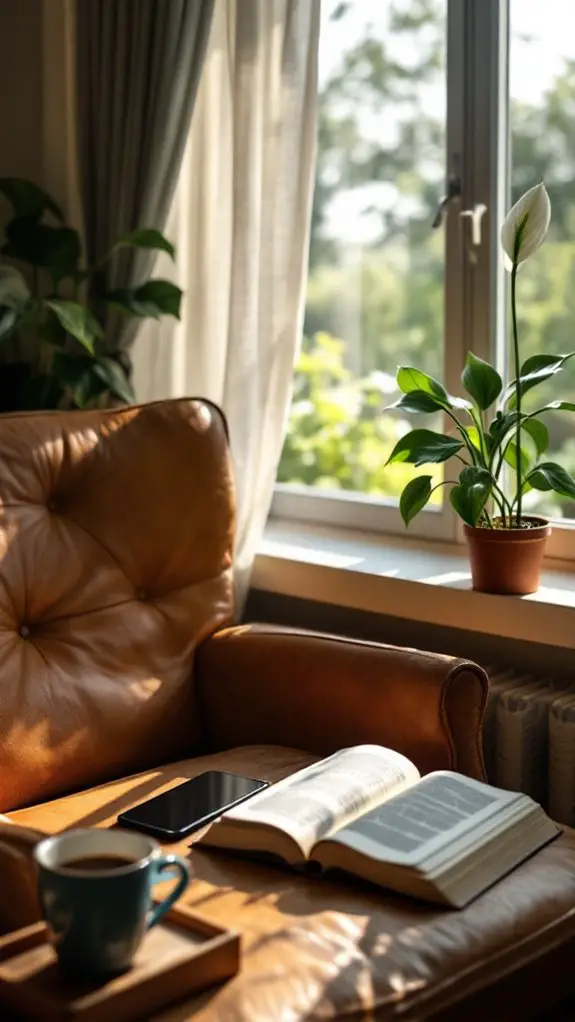
Taking a break from our digital devices has become increasingly essential in today’s hyper-connected world. A digital detox involves intentionally stepping away from smartphones, computers, and tablets to improve your mental well-being and enhance real-world connections. The reduced attention spans from excessive screen time make it harder to focus on important tasks.
Start your detox journey by setting clear, achievable goals. Studies show that half of teens feel addicted to their phones. You’ll want to gradually reduce your screen time rather than attempting a complete cutoff. Create tech-free zones in your home, particularly in bedrooms and dining areas, and establish specific times when devices aren’t allowed.
Consider implementing a “digital curfew” before bedtime to improve your sleep quality. To make your detox more manageable, turn off non-essential notifications and use screen-limiting apps to track your usage. Regular digital decluttering will help you maintain focus – unsubscribe from unnecessary emails, organize your files, and delete unused apps.
You’ll find it easier to practice mindful consumption when you’ve streamlined your digital space. When you experience withdrawal symptoms, engage in physical activities or rediscover offline hobbies. Find a detox buddy who’ll provide accountability and support throughout your journey.
Practice mindfulness and meditation to manage any anxiety about being disconnected. For lasting change, reflect on your detox experience and maintain healthy boundaries with technology.
Set daily screen time limits and establish tech-free routines, such as morning rituals without devices or weekly TV-free days. If you’re struggling with digital addiction, don’t hesitate to seek professional guidance. Remember, the goal isn’t to eliminate technology but to create a healthier relationship with it.
Self Care Through Simplicity
Self-care doesn’t require elaborate routines or expensive products – it thrives in simplicity. By focusing on fundamental practices that nurture your physical, emotional, and spiritual well-being, you’ll create a sustainable approach to self-care that fits naturally into your daily life.
Start with your physical health as your foundation. Make time for regular exercise, even if it’s just a 15-minute walk. Pay attention to your nutrition by choosing whole foods and staying hydrated throughout the day. Establish a consistent sleep schedule, and don’t skip your regular medical check-ups. Using a digital tracking app can help you monitor and adjust your self-care activities over time.
For emotional balance, incorporate mindfulness into your daily routine. Take a few minutes each day to meditate or practice deep breathing. Try journaling to process your thoughts and emotions. Declutter your space regularly – a tidy environment can help clear your mind. Make time for activities you truly enjoy, whether it’s painting, gardening, or playing music. Body scan meditation can be particularly effective for managing daily stress.
Nurture your spiritual growth by connecting with what gives your life meaning. Spend time in nature, join community groups that align with your values, or explore practices like yoga that combine physical and spiritual elements. Continue learning and growing through new experiences that challenge and inspire you.
Create simple daily habits that support your well-being. Begin each day with a brief morning routine that sets a positive tone. Take short breaks throughout the day to stretch or breathe deeply. Limit screen time before bed, and maintain a schedule that allows for both productivity and rest.
Remember to prioritize activities that bring you genuine joy and fulfillment.
Conclusion
You’ll find that embracing simple living isn’t about deprivation – it’s about creating space for what truly matters. By implementing these tips into your daily life, you’re taking steps toward a more intentional and fulfilling existence. Start small, be patient with yourself, and remember that simplicity is a journey, not a destination. Your path to a simpler life begins with one mindful choice at a time.

Erzsebet Frey (Eli Frey) is an ecologist and online entrepreneur with a Master of Science in Ecology from the University of Belgrade. Originally from Serbia, she has lived in Sri Lanka since 2017. Eli has worked internationally in countries like Oman, Brazil, Germany, and Sri Lanka. In 2018, she expanded into SEO and blogging, completing courses from UC Davis and Edinburgh. Eli has founded multiple websites focused on biology, ecology, environmental science, sustainable and simple living, and outdoor activities. She enjoys creating nature and simple living videos on YouTube and participates in speleology, diving, and hiking.

